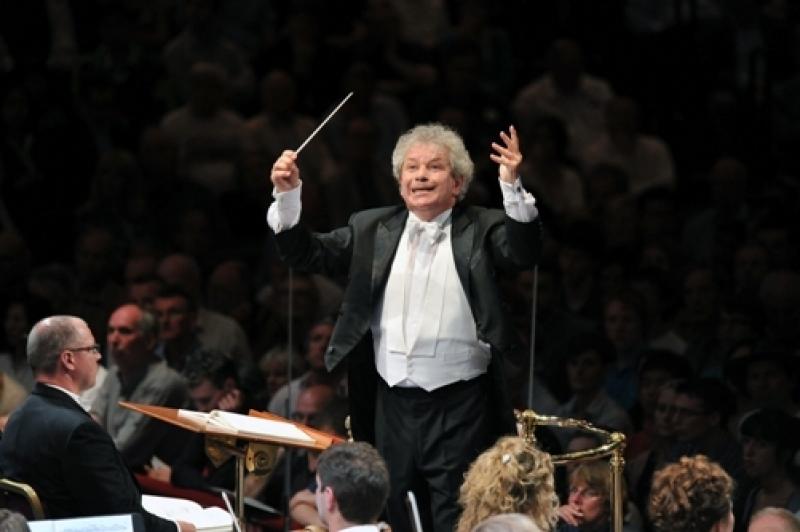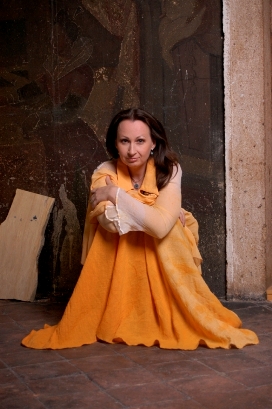The Bartered Bride, BBCSO, Bělohlávek, Barbican Hall | reviews, news & interviews
The Bartered Bride, BBCSO, Bělohlávek, Barbican Hall
The Bartered Bride, BBCSO, Bělohlávek, Barbican Hall
Leading lovers are low on charm, but Smetana's rustic comedy zips along

What a relief, for half of last night's semi-staged concert performance, to have left behind Britten's claustrophobic wood at English National Opera and to seek refuge in Smetana's Bohemian village inn of good cheer.
Unfortunately the soprano and tenor taking the roles of the young village people whose true love we never doubt will triumph over hard cash and misalliance weren't really among the loveable ones. Vocally, they were secure if singular. Dana Burešová (pictured below) played a shrewd, responsive Mařenka, well able to look after herself until the bartering seems to turn sour, and Kenneth Richardson's lively direction gave her plenty to react to. But it's so hard to forget the loveliest interpreter of the role, peaches-and-cream soprano Gabriela Beňačková, when Burešová's tone is more the kind that would curdle milk, albeit with the occasional bouquet of roses in bloom on selected top notes. I wouldn't mind seeing her as Verdi's Lady Macbeth, but the sound isn't right when, in the later of many revisions, Smetana finally gives his heroine an aria of supreme pathos, a moment of Mozartian depth with Tristan overtones.
 Oddly we weren't involved in this, nor in the curiously uncharismatic stance of the tenor singing Mařenka's true love Jeník. It's a role with an often insanely high tenor tessitura, so there was much to be thankful for that Tomáš Juhás could cut the mustard in that distinctively Czech/Slovak style. But charm? Forget it. That was why we all rooted, I think, for Aleš Voráček's Vašek, the stammering mummy's boy to whom Mařenka is supposed to be married off. Voráček, so poignantly matched by Bělohlávek and the orchestra in his Act III arietta of perplexity, delightfully underplayed the tomfoolery, restricting it to his large number of baffled entrances and exits - an economy from which Jozef Benci as the marriage broker basso buffo Kecal could have learnt. He warmed to the fuller, deeper resonances, but it's a painfully unfunny part, and I always long for the Act I ensembles in which he expounds his plans at soporific length to be over. The last of many cameo-role singers, the younger bass Ondrej Mráz, as the circus Indian "from Tahiti", gave every indication that he would have made a better job of it.
Oddly we weren't involved in this, nor in the curiously uncharismatic stance of the tenor singing Mařenka's true love Jeník. It's a role with an often insanely high tenor tessitura, so there was much to be thankful for that Tomáš Juhás could cut the mustard in that distinctively Czech/Slovak style. But charm? Forget it. That was why we all rooted, I think, for Aleš Voráček's Vašek, the stammering mummy's boy to whom Mařenka is supposed to be married off. Voráček, so poignantly matched by Bělohlávek and the orchestra in his Act III arietta of perplexity, delightfully underplayed the tomfoolery, restricting it to his large number of baffled entrances and exits - an economy from which Jozef Benci as the marriage broker basso buffo Kecal could have learnt. He warmed to the fuller, deeper resonances, but it's a painfully unfunny part, and I always long for the Act I ensembles in which he expounds his plans at soporific length to be over. The last of many cameo-role singers, the younger bass Ondrej Mráz, as the circus Indian "from Tahiti", gave every indication that he would have made a better job of it.
No reservations at all, either, about the handsomely cast sets of parents, with the ladies especially - comic fruity Lucie Hilscherová and sympathetic, dignified Stanislava Jirků - bringing warmth to the simple depths of the great Act III Sextet. In fact, the whole of the concert's second half revealed Smetana rising to every new challenge, not least the much-needed injection of a visiting circus announced by a scene-stealing declamation from Jaroslav Březina's Ringmaster. And here was a typical case in point of Belohlávek lavishing almost more love on simple recitative than it deserved: how did he get the strings to bring so much rich colouring to a single punctuating chord?
The whole orchestra, in fact, had to take on multiple roles, from the ants-in-pants hurly-burly of Overture and Dance of the Comedians - the most joyful encore material in the entire orchestral repertoire, surely - to aping local musicians in the early chorus scenes, crisply done by the excellent BBC Singers, and growing up regretfully when the characters do. Special credit to Richard Hosford, quick-changing from rustic clarinettist to songbird and sorrowful sounding board for our tender-hearted lovers, to circus trumpeter Michael Moller and to the virtuoso relish with which John Chimes rang the changes on the timpani parts in the dances. And thanks to Belohlávek for not over-sophisticating the many polkas as if they were by Vienna's Strausses rather than plain-speaking numbers for Bohemia's populace.
For all the orchestral range, the eventual recording that's been taken from this performance, with patching to follow, won't displace pride of place for the Supraphon CDs - soundtrack to an equally charming film - where Beňačková and Peter Dvorský knock sympathetic spots off Belohlávek's lovers. What the evening did do was have me want to get up and join the circus, like Vašek as lured by the voluptuous curves of gypsy Esmeralda Salamanca (Kateřina Kněžíková, pert and pretty), and make me as happy as a child. By which, of course, I don't mean the likes of Britten's little master Miles, but rather the two who get a line each as village kids announcing Vašek as a bear on the loose - a panda, not sure why - Maxim Dusek and Babette Rust. They deserve a credit as much as any of the bit-part players for bringing broad grins to the audience in a more than pleasant evening.
- See what's on in the BBC Symphony Orchestra's 2011-12 Barbican season
- BBC Symphony Orchestra Proms featured in theartsdesk's pick of the summer festival
Watch Beňačková and Dvorský in the Act III duet of The Bartered Bride
Listen to Karel Ančerl conduct the Dance of the Comedians in 1947
The future of Arts Journalism
You can stop theartsdesk.com closing!
We urgently need financing to survive. Our fundraising drive has thus far raised £49,000 but we need to reach £100,000 or we will be forced to close. Please contribute here: https://gofund.me/c3f6033d
And if you can forward this information to anyone who might assist, we’d be grateful.

Subscribe to theartsdesk.com
Thank you for continuing to read our work on theartsdesk.com. For unlimited access to every article in its entirety, including our archive of more than 15,000 pieces, we're asking for £5 per month or £40 per year. We feel it's a very good deal, and hope you do too.
To take a subscription now simply click here.
And if you're looking for that extra gift for a friend or family member, why not treat them to a theartsdesk.com gift subscription?
more Opera
 First Person: Kerem Hasan on the transformative experience of conducting Jake Heggie's 'Dead Man Walking'
English National Opera's production of a 21st century milestone has been a tough journey
First Person: Kerem Hasan on the transformative experience of conducting Jake Heggie's 'Dead Man Walking'
English National Opera's production of a 21st century milestone has been a tough journey
 Madama Butterfly, Irish National Opera review - visual and vocal wings, earthbound soul
Celine Byrne sings gorgeously but doesn’t round out a great operatic character study
Madama Butterfly, Irish National Opera review - visual and vocal wings, earthbound soul
Celine Byrne sings gorgeously but doesn’t round out a great operatic character study
 theartsdesk at Wexford Festival Opera 2025 - two strong productions, mostly fine casting, and a star is born
Four operas and an outstanding lunchtime recital in two days
theartsdesk at Wexford Festival Opera 2025 - two strong productions, mostly fine casting, and a star is born
Four operas and an outstanding lunchtime recital in two days
 The Railway Children, Glyndebourne review - right train, wrong station
Talent-loaded Mark-Anthony Turnage opera excursion heads down a mistaken track
The Railway Children, Glyndebourne review - right train, wrong station
Talent-loaded Mark-Anthony Turnage opera excursion heads down a mistaken track
 La bohème, Opera North review - still young at 32
Love and separation, ecstasy and heartbreak, in masterfully updated Puccini
La bohème, Opera North review - still young at 32
Love and separation, ecstasy and heartbreak, in masterfully updated Puccini
 Albert Herring, English National Opera review - a great comedy with depths fully realised
Britten’s delight was never made for the Coliseum, but it works on its first outing there
Albert Herring, English National Opera review - a great comedy with depths fully realised
Britten’s delight was never made for the Coliseum, but it works on its first outing there
 Carmen, English National Opera review - not quite dangerous
Hopes for Niamh O’Sullivan only partly fulfilled, though much good singing throughout
Carmen, English National Opera review - not quite dangerous
Hopes for Niamh O’Sullivan only partly fulfilled, though much good singing throughout
 Giustino, Linbury Theatre review - a stylish account of a slight opera
Gods, mortals and monsters do battle in Handel's charming drama
Giustino, Linbury Theatre review - a stylish account of a slight opera
Gods, mortals and monsters do battle in Handel's charming drama
 Susanna, Opera North review - hybrid staging of a Handel oratorio
Dance and signing complement outstanding singing in a story of virtue rewarded
Susanna, Opera North review - hybrid staging of a Handel oratorio
Dance and signing complement outstanding singing in a story of virtue rewarded
 Ariodante, Opéra Garnier, Paris review - a blast of Baroque beauty
A near-perfect night at the opera
Ariodante, Opéra Garnier, Paris review - a blast of Baroque beauty
A near-perfect night at the opera
 Cinderella/La Cenerentola, English National Opera review - the truth behind the tinsel
Appealing performances cut through hyperactive stagecraft
Cinderella/La Cenerentola, English National Opera review - the truth behind the tinsel
Appealing performances cut through hyperactive stagecraft
 Tosca, Royal Opera review - Ailyn Pérez steps in as the most vivid of divas
Jakub Hrůša’s multicoloured Puccini last night found a soprano to match
Tosca, Royal Opera review - Ailyn Pérez steps in as the most vivid of divas
Jakub Hrůša’s multicoloured Puccini last night found a soprano to match

Add comment